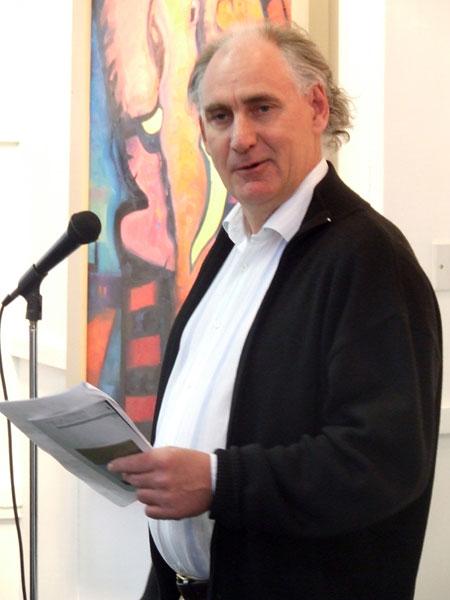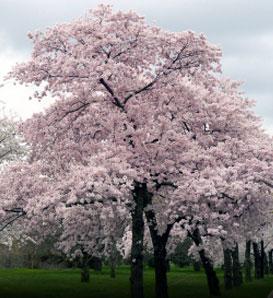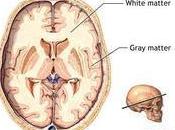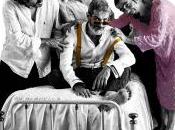
Gerard Hanberry
Gerard (Gerry) Hanberry (1955) è un noto poeta e scrittore irlandese, che vive a Galway e ha pubblicato varie raccolte di poesie che gli hanno guadagnato numerosi premi nazionali. È stato giornalista, con una sua rubrica settimanale su un quotidiano nazionale, perfino cantautore – attività che ancora svolge occasionalmente - e tiene corsi universitari di scrittura creativa e scrittura poetica a Galway.
Ha pubblicato tre raccolte di poesie, Rough Night, Stonebridge Publications, 2002, Something Like Lovers, Stonebridge Publications, 2005 e At Grattan Road, 2009. Una quarta raccolta uscirà a breve. Ha vinto il Brendan Kennelly Sunday Tribune Poetry Award ed è stato finalista in numerosissimi premi nazionali di poesia. È stato invitato ai più importanti festival poetici e a reading pubblici e ha tenuto reading delle sue poesie sia alla radio nazionale che alla TV nazionale irlandese RTE.
È membro permanente della commissione del Cùirt International Festival of Literature.
Nel 2011 ha pubblicato un’originalissima e documentatissima biografia di Oscar Wilde, More lives than one, in cui per la prima volta si indaga non solo sulla vita e sulle tragiche vicende del genio Wilde, ma, con il supporto di molti documenti fino ad ora inediti (parte dei quali forniti dai discendenti di Wilde) si traccia un quadro in parte ancora sconosciuto delle origini familiari e delle motivazioni che condussero Wilde alla sua fine infelice. Il tutto senza avere però la pesantezza di una fredda biografia, ma con una felicissima scrittura allo stesso tempo documentata e poetica, narrativa e stringata. Il libro ha ricevuto recensioni entusiastiche ed è stato presentato anche a Dublino, nella residenza e al cospetto del Presidente della Repubblica, che ha voluto congratularsi personalmente con Hanberry.
Quando ho chiesto a Gerry Hanberry il permesso di pubblicare alcune sue poesie tradotte in italiano, non solo è stato entusiasta, ma la sua gentilezza è giunta fino a mandarmi personalmente questi testi. Gli ultimi due testi sono inediti anche in inglese e usciranno in ottobre come parte della sua quarta raccolta. Dunque sono per il lettore italiano un dono prezioso.
Hanberry non è mai stato tradotto in italiano ed è dunque per me un grande onore essere la sua prima traduttrice. Ringrazio di questo Gerard Hanberry con gratitudine.
********
BRACI
Questo testo ha vinto il Brendan Kenelly/ Sunday Tribune Award nel 2006
Quando Apollo ordinò a Mitra il sacrificio d’un toro
a malincuore obbedì, lo si vede in mosaici
con il volto girato. Quando il toro morì divenne
luna, ed il cielo stellato il mantello di Mitra.
Dal sangue del toro germogliò il primo grano,
i primi rossi grappoli. Ogni altra cosa germinò
dal suo seme, eccetto lo scorpione.
Lo scorpione si beve sangue e seme.
*
I loro giorni trascorrono in silenzi
o frasi fatte, arrivano e poi vanno,
tenendo duro come meglio possono,
ritraendosi dietro le abitudini
e in stanze vuote a sud,
ignorando che mai nessuno viene.
E tuttavia fan l’amore,
più con speranza che con passione,
come due naufraghi
tengono acceso il segnale luminoso
nella remota ipotesi,
dandosi il turno a soffiar sulle braci,
a raddrizzare il segnale d’aiuto
fatto con pietre bianche
lungo la spiaggia.
Ogni notte arrivano i frangenti
A spazzar via le orme,
ora quelle di lui, ora di lei.
*
Avevano ragione i cartografi antichi;
si può precipitare dal limite del mondo
ed esistono i mostri degli abissi
lì dove le antiche mappe li ponevano.
*
Guglie di pini, medievali, qua e là nella campagna d’ambra;
silenzio non ancora rotto dal traffico sull’Aurelia.
Lei dorme poco nella stanza dal soffitto alto, le paure fruscianti
come creature notturne nel bosco, l’aria è già secca come foglie morte.
Ieri un uomo, nel negozio dei regali ha sorriso ma non era
un sorriso d’estraneo quello che voleva. No, non il suo, non il suo.
Un grande uccello, forse un falco, si leva dispiegando le ali e vola in circoli,
petali bianchi s’incurvano in veranda, conchiglie madreperla sparse sulle pareti decorate.
Sul comodino, accanto alla sua testa addormentata,
la scritta sul cartello in stampatello NON DISTURBARE.
*
Dove l’antico fiume forma un’ansa
attraverso la terra arsa della campagna
è difficile distinguere dove l’est e dove l’ovest.
Una lucertola, la gola pulsante nella calura,
sta ferma su una roccia, attende, ascolta,
poi guizza nella crepa polverosa.
Lei resta nella piazza, mentre lui sale
le scale verso la grande cupola della basilica.
Più su, più su, lentamente s’avvolge, un inno, un canto,
forse non è troppo tardi, amore mio, forse non è troppo tardi.
poi la città gli si stende di fronte, il colonnato
curvo di San Pietro, ellittico, come una chela.
La vede giù lontana tra i turisti vaganti,
accanto alla fontana, minuscola, non puoi confonderla.
Vuole gridare. Il cielo è un marmo azzurro e
stupendo, han fatto bene a venire. Ma lei si muove,
passa accanto all’obelisco di Nerone, la cui lunga ombra nera
attraversa la piazza, una coda, la punta aguzza un pungiglione.
*
Sono arrivati ai ruderi di Ostia.
Lui all’ombra sfoglia la guida,
il berretto calato contro la vampa della luce bianca,
lei s’aggira vagando, facendosi strada
attraverso cortili vuoti, colonne inclinate
e irregolari, verso il silenzio di un anfiteatro dove
si siede, ginocchia ripiegate, ad osservare tre gatti randagi
allontanarsi sui gradini come voglie respinte con dolcezza.
Nella frescura del tempio di Mitra si dividono
del pane casareccio e del Chianti, versando il vino in bicchieri di plastica,
qualche gocciola rossa cade sopra i mosaici, sullo scorpione
ed attraversa il toro, il collo teso alla lama.
Vicino alla via Ostiense siedono separati nell’ombra che si addensa,
lungo l’antica strada ha marciato un impero,
ora non c’è clangore di legioni, né pulsazioni di seme e di sangue,
solo tazze di plastica che scricchiolano.
Poi esili attraverso le ere e il farsi del crepuscolo
chiamati forse dal loro sgomento, dalla sconfitta, giungono attutiti
dei suoni, una donna singhiozza, una porta chiusa ed inchiodata,
l’ultimo carro carico che s’avvia cigolando verso Roma.
EMBERS
When Apollo ordered Mithras to sacrifice a bull
he carried out the task unwillingly, mosaics depict
his face averted. As the bull died the animal became
the moon, Mithras’ mantle the starry sky.
From the bull’s blood the first corn sprouted,
the first purple grapes. Every other thing sprang
from his seed, except the scorpion.
The scorpion drinks seed and blood.
*
Their days are passed in silences
or set pieces, coming and going,
holding out as best they can,
retreating into props and costumes
and south facing rooms,
ignoring the fact that no one ever calls.
And still they make love,
more in hope then passion,
like two castaways
keeping the signal-fire burning
on the off chance,
taking turns to fan the embers,
to straighten the help sign
built with white stones
along their beach.
Each night the great breakers roll in
to wipe away the footprints,
now his, now hers.
*
The old cartographers were right;
it is possible to drop off the edge of the world
and monsters of the deep exist
exactly where the ancient charts placed them.
*
Spires of pine trees, medieval, here and there on the amber hillside;
silence not yet shattered by traffic on the Strada Aurelia.
She sleeps little in this high-ceilinged room, her fears rustling
like night-creatures in the wood, the air already dry as dead leaves.
Yesterday, a man in the gift-shop smiled but it was not
a stranger’s smile she wanted. No, not his, not his.
A great bird, a hawk maybe, rises broad-winged and circles, circles,
white petals curl on the veranda, pearl-shells loose from the patterned wall.
On the bedside table near his sleeping head,
the door-sign in bold lettering – DO NOT DISTURB.
*
Where the ancient river winds
through the scorched earth of Campagna
it’s hard to know east from west.
A lizard, throat pulsing in the heat,
clings to a rock, waits, listens,
then slithers for his dusty crevice.
She remains in the Piazza while he climbs
the stairs to the Basilica’s great dome.
Higher, higher, slowly winding, a hymn, a chant,
perhaps it’s not too late, my love, perhaps it’s not too late.
Then the city spreads before him, the curving
colonnades of St. Peter’s, elliptical, like a claw.
He sees her far below among the wandering tourists,
standing near the fountain, tiny, unmistakable.
He wants to call out. The sky is marble blue and
beautiful; they were right to come. But she moves,
crossing by Nero’s obelisk, its shadow long and black
across the square, a tail, its sharp point the sting.
*
They have arrived at the ruins of Ostia.
He thumbs the guidebook in the shade,
cap pulled low against the blaze of white sunlight,
she prowls the edges, making her own way
through empty courtyards, the tilt and stagger
of columns, to the still of an amphitheatre where
she sits, knees drawn up, watching three wild cats
move away over the steps like wishes softly rebuffed.
In the cool of Mithras’ Temple they share Casareccio
bread and Chianti, splashing wine into plastic cups,
red droplets falling on the mosaic floor, on the scorpion
and across the bull, his neck stretched for the blade.
By the Via Ostiense they sit apart in deepening shadow,
down this ancient road an Empire marched,
no clang of legions now, no throb of seed and blood,
just the dry crackle of their plastic cups.
Then faint through the ages and the gathering twilight,
drawn perhaps by their dismay, their defeat, come faded
sounds, a woman sobbing, a door being nailed and shuttered,
the last bundled cart creaking up the road for Rome.
**********
LO STALLONE MARINO
Troppo vecchi ormai per stare su una barca
e non comunque col mare agitato,
pensammo di tornare fino a Na Clocha,
Steve e io, e buttare una lenza,
magari cercare qualche scorfano nascosto
nelle fessure in fondo alla scogliera.
Quella mattina era alta la marea con delle belle raffiche
così c’accomodammo su una pietra a vedere come buttava la giornata.
Steve lo vide per primo, alzarsi di lontano,
la testa e il collo tesi, una fluente criniera bianca,
il petto ampio, i grandi fianchi rotondi
dietro la bianca coda che s’arricciava in alto
nello slanciarsi d’impeto verso la riva.
Capimmo subito che era lo stallone marino.
E nell’avvicinarsi alla scogliera si levò sulle zampe posteriori
e con balzo possente superò la parete
cadendo con clangore sulla pietra nemmeno a venti passi
da dove noi stavamo a farci il segno della croce,
poiché quello che vedevamo non era cosa di questo mondo.
Si raddrizzò e si lanciò all’interno dell’isola.
Non una sola parola dicemmo ad anima viva,
chi ci avrebbe creduto comunque all’età nostra,
ma quando Paddy Dick scoprì che la sua cavalla era incinta
e non poté spiegarlo, allora ne parlammo.
Non sono tornato mai più alla scogliera
e spesso il mio sonno è agitato.
( Nota di Traduttore. The Sea Stallion è una creatura del folklore irlandese, anche detto Phooka, la cui natura è assai pericolosa.)
SEA-STALLION
Da “The Stinging Fly”
Too old now for the open boat
on frothy days anyway,
we thought to go back as far as Na Clocha,
Steve and myself, and drop a line,
maybe try for some rockfish hiding
in the cracks at the foot of the cliff.
The tide was big that morning with a good gust up
so we sat back on a stone to see what the day would do.
Steve saw it first, rising far out,
its straining head and neck, a flowing white mane,
its huge chest, its great round flanks
and a white tail curling high behind
as it charged headlong towards the shore.
We knew straight away it was the sea-stallion.
Nearing the cliffs he rose on his hind legs
and with one mighty leap cleared the face
clattering down on the flag not twenty steps
from where we stood making the sign of the cross,
for what we had seen was not of this world.
He steadied himself and headed off across the island.
Not a word did we say to anyone,
who would have believed us anyway at our age,
but when Paddy Dick found his mare to be with foal
and couldn’t explain it, we spoke up.
I’ve not been over to the cliffs since
And my sleep is often astray.
*************
OCCHIALI DA SOLE
Ieri io ero il pesce che s’incurva
nel mulinello presso il ponte a schiena d’asino
e tu eri la dolce corrente del fiume
che carezza i ciottoli lisci sul fondo sabbioso.
Poi tu eri la luce gialla tra le tende
della finestra al terzo piano e io ero l’uomo
dal cappotto lungo con il cappello e la sigaretta
appoggiato al lampione giù in strada.
Questa mattina, guardandoti in giardino
con le cesoie e il cesto seppi che tu eri
i raggi di miele che si riversano dagli occhi
di quell’antico ponte ai limiti del bosco.
e io non ero più il pesce che s’incurva
nel gorgo oscuro, invece ero adesso
l’airone silenzioso a monte nel canneto
con un cappotto grigio e gli occhiali da sole
molto simili al paio costoso che hai riportato dall’Italia,
quelli che uso solo per occasioni formali
o quella volta al chiuso della nostra stanza d’albergo
a Cascais alle due della mattina.
SHADES
Yesterday I was the bending fish
in the swirlpool by the humpback bridge
and you were the river’s gentle current
stroking the smooth pebbles on the sandy bed.
Later, you were the yellow light between the curtains
in the third-floor window and I was the man
in the long coat and hat with a cigarette
leaning against the streetlamp down below.
This morning, as I watched you in the garden
with pruner and basket I knew that you were
the honey-beams pouring through the eye
of that ancient bridge at the edge of the woods
and the I was no longer the bending fish
in the dark pool, instead I was now
the silent heron upstream in the reeds
wearing a grey cloak and dark shades
very like the expensive pair you brought home from Italy,
the ones I take out only on state occasions
or that one time in the privacy of our hotel room
in Cascais at two o’clock in the morning.
SAKURA[1]
A Okinawa a sud fioriscono i primi Sakura
la nuvola di fiori si spinge lenta a nord
verso Kyoto e Tokio, delicata onda di petali,
seguita lungo la via da innamorati
in attesa dei primi boccioli
e poi l’hanami sotto l’esplodere dei petali.
(Sakura è il meraviglioso ciliegio da fiore giapponese, simbolo d’amore e di giovinezza. L’hanami è il tradizionale picnic sotto gli alberi in fiore.)
SAKURA
In Okinawa to the south the first Sakura blooms,
the blossom-clouds creep slowly north
towards Kyote and Tokyo, a gentle petal-wave,
tracked all the way by lovers
watching for the early buds
and then the Hanami beneath the petal-burst.
(Sakura is the beautiful Japanese Flowering Cherry, symbol of love and rejuvenation.
Hanami is a traditional picnic beneath the blooming tree.)
[1] Il testo è stato ispirato dalla tragedia del recente tsunami nel nord del Giappone.)
(C) 2012 Gerard Hanberry per i testi originali – (C) 2012 Francesca Diano per le traduzioni. RIPRODUZIONE RISERVATA





